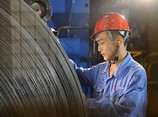
Donna Kwok, HSBC's Greater China economist, said that despite continued troubles in Europe and China's slow pace of recovery, Hong Kong battled through the third quarter and came out stronger for it. Domestic demand stayed buoyant, supported by continued wage growth and a resilient job market. With China's economy now past its bottom, we expect Mainland demand to further cement Hong Kong's ability to expand by 2 percent year-on-year this year and 5. 2 percent in 2013.
According to the statistics, external demand remained subdued in the face of the recession-ridden eurozone, slow-growing U.S. economy, and the ensuing set-back in Asian production and trade flows. Yet helped partly by a low base of comparison a year earlier, total exports of goods still had a moderate year-on-year growth at 4 percent in real terms in the third quarter, though with widespread weaknesses still evident across the EU, the U.S. and many major Asian markets. Exports of services slowed visibly to only a meager 0.1 percent year-on-year growth over the same period.
Domestically, thanks to largely sanguine job and income conditions, private consumption expenditure grew steadily further by 2.8 percent in real terms in the third quarter over a year earlier. Meanwhile, investment spending picked up to a strong 8.7 percent growth, on the back of robust private machinery and equipment acquisition, intensive large-scale infrastructure works, as well as a further surge in private sector building activity.
The labor market held largely stable in the third quarter, though with signs of slowdown in total employment emerging towards the end of the quarter, causing the seasonally adjusted unemployment rate to edge up to 3.3 percent. In the third quarter, the median employment earnings rose by 8.3 percent in nominal terms over a year earlier, representing an increase of 5.1 percent in real terms after discounting inflation.
















 Hunan college girl designs cheongsam inspired by women's secret language
Hunan college girl designs cheongsam inspired by women's secret language


![]()
